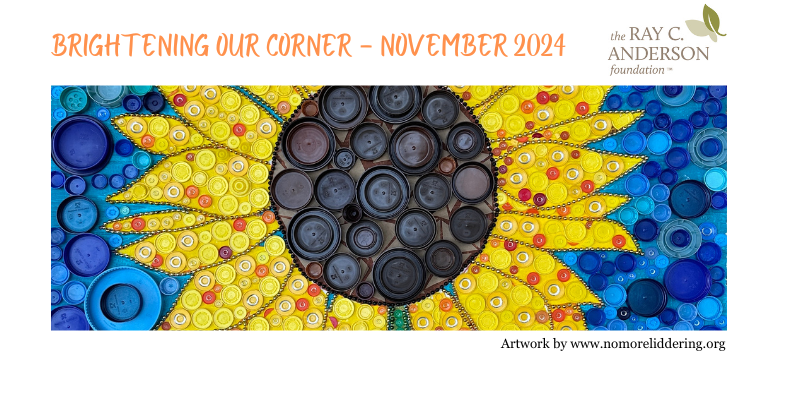Brightening Our Corner - November 2024
Quarterly Newsletter of the Ray C. Anderson Foundation
Published 11-27-24
Submitted by Ray C. Anderson Foundation

FOUNDATION NEWS
The Magic Behind RayDay
For those of you who’ve been with us for the past decade, please know that the real “magic" behind RayDay comes from Sue Anne Morgan and the incredible team at idealand. While we’ve always strived to make RayDay as sustainable as possible, it’s Sue Anne and her team that have helped us elevate RayDay to the event it is today. With her leadership, we moved from a “sustainably-minded” event to a climate neutral, zero-food waste event.
Sue Anne has always been there to help ensure we make mindful decisions through a true green lens. Examples include food trucks with locally sourced food, commercially compostable plates, cups, napkins, utensils, natural sodas, sustainable beer and wine choices, and dedicated waste ambassadors, well placed to be sure we stay on the right track.
If you’re considering your own event in and around Atlanta, and you want to make it green and truly “walk the talk,” idealand should be your partner of choice. Sue Anne even wrote a blog explaining how she does it. Read "Tips for Planning a Green Event.”
Several new exhibitors joined us this year in the Kids Tent. The header of this newsletter features the work of No More Liddering, which engaged kids at RayDay to create beautiful art from recycled and otherwise non-recyclable materials like plastic drink lids and Mardi Gras beads.
Atlanta Toolbank helped kids build toys while learning about the shared economy, and The Wylde Center featured art activities based on the natural world.
Other highlights from RayDay 2024 included an expanded EV Showcase area with the latest OEM vehicles from Kia and Porsche, a fleet vehicle from Cobb County Fleet Management, two electric buses (Blue Bird’s EV school bus and a 14 passenger EV shuttle bus from Amplify Your Ride), and a DRIVE H2 hydrogen golf car from Yamaha. Read a full recap of RayDay 2024 here.
Mobile Solar Microgrid Trailer Deployed to Support Hurricane Helene Recovery Efforts
In late September, following Hurricane Helene, The North Georgia Conference of The United Methodist Church deployed a solar-powered disaster response trailer that the Foundation funded in 2023 through a grant to the Footprint Project.
The trailer's first-ever deployment was to Camp Tygart outside of Valdosta where it provided power for lights, freezers, refrigerators, and a cooling station for early responders working in the hardest hit communities in South Georgia. This trailer is the first solar microgrid of its type, built in Georgia, for use in Georgia. Read the full story.
RAY C. ANDERSON CENTER FOR SUSTAINABLE BUSINESS
Annual Report
The Center supports Scheller College’s vision of being a global leader in education, research, and inclusive innovation to advance business and improve the human condition. It empowers the leaders of tomorrow to create sustainable businesses and communities. The 2023-24 Annual Report includes stories about student success, faculty research, collective impact initiatives, and more. Read the report.
Scheller's MBA Net Impact Chapter Recognized
Scheller College’s Net Impact MBA Chapter was selected as the 2023-24 U.S. Graduate Chapter of the Year. Awards are given to chapters demonstrating dedication to Net Impact’s mission to inspire and equip emerging leaders to build a more just and sustainable world. Five chapters (among 300 global chapters) are honored annually. Emily Bodiford, MBA ’23, said, “This recognition underscores our commitment to driving positive change and creating lasting impact within our community and beyond.” Read the article.
Equity in Sunshine
Amanda Ehrenhalt, an industrial and systems engineering major who is committed to sustainability on campus and in her future career, shares lessons learned from a transformative summer internship with Renewvia Solar Africa. The internship solidified Amanda’s desire to pursue a career that can make a more equitable and sustainable world. Read the reflection.
Beril Toktay on Scheller Business Insights
Scheller Business Insights is a dynamic video series that highlights the innovative thought leadership of Scheller faculty. In a recent episode, Ray C. Anderson Center for Sustainable Business Faculty Director, Beril Toktay, defines net zero and discusses some ways to alleviate climate change by reducing carbon emissions to the point of net zero emissions. Watch the video.
DRAWDOWN GEORGIA BUSINESS COMPACT
The Drawdown Georgia Business Compact leverages the collective impact of the Georgia business community to achieve net zero carbon emissions in the state through a just, prosperous, and sustainable transition. Three members of the Compact spent the summer making progress in their efforts to positively impact the circular economy. The Forest Carbon Working Group has been busy bringing together key marketplace and educational leaders to address maximizing carbon removal, new economic opportunities for landowners, and protecting biodiversity in the state. Also, the Compact collaborated with Georgia Tech partners to convene experts for a workshop on driving sustainable aviation fuel in the Southeast.
DRAWDOWN GEORGIA
Climate Solutions for Congregations
Drawdown Georgia and Georgia Interfaith Power & Light (GIPL) co-hosted this special conversation with representatives from congregations across our state who are putting climate solutions into action. From installing rooftop solar and improving energy efficiency to installing EV chargers to creating composting and recycling programs, there are so many ways for congregations to reduce GHG emissions and help solve for climate. Watch the video.
Electric School Buses Drive Progresss on Climate Solutions in Georgia
Electrifying transportation in Georgia is a powerful climate solution, and the benefits of upgrading to electric school buses go beyond carbon. The transition to electric buses supports the local economy and can positively impact our kids' health, too.
We recently spoke with representatives from 2024-25 Climate Solutions & Equity Grant recipients Mothers & Others for Clean Air about their partnership with the Georgia State Medical Association and Georgia Clinicians for Climate Action to advance the transition to electric school buses in Georgia’s school districts.
The Drawdown Georgia Climate Solutions & Equity Grants program is a collaborative philanthropy initiative to meet grassroots community-based organizations where they are at the intersection of climate and equity. Funders for this grant included the Ray C. Anderson Foundation, the Ghanta Family Foundation, the Wilbur & Hilda Glenn Foundation, the Dobbs Fund, the Reilly Family Fund, and the Tull Charitable Foundation. Read the full story here.
Sustainable Transportation: A Climate Digest Interview
Transportation is the largest source of greenhouse gas emissions in Georgia. Choosing to walk, bike, or take mass transit to get where you’re going can have a big impact when enough of us make small changes in how we get around. Tune into this interview with John Devine, executive director of Go Georgia (formerly Georgia Bikes) to learn all about sustainable transportation alternatives. Watch the video.
Drawdown Georgia Sustainable Transportation Toolkit
John Devine, executive director of Go Georgia (formerly Georgia Bikes) is the author of Drawdown Georga's latest climate solutions toolkit. Click here for the toolkit.
BIOMIMICRY INSTITUTE
Biomimicry Institute Unveils New 10-year Strategy
The Biomimicry Institute, a nonprofit organization committed to advancing a Nature Positive, inclusive, and regenerative world inspired and guided by nature’s genius, announced the launch of its ambitious 10-year strategy at New York Climate Week.
Amanda Sturgeon, CEO of The Biomimicry Institute, commented, “Our new strategic plan acknowledges the critical urgency of today’s environmental and societal challenges, yet we approach these issues with optimism and enthusiasm. We are confident that biomimicry can play a transformative role in creating a Nature Positive future, where our solutions not only address these challenges but do so with a sense of joy and hope, aligning human systems with nature’s wisdom”
This new plan directly addresses three critical global challenges: climate change and biodiversity loss, the disconnection between humans and nature, and the pervasive ‘take-make-waste’ culture. Read the plan here.
Focus on the 2024 Ray of Hope Accelerator Cohort
In today’s fast-paced world, we all seek connection, a sense of belonging, and purpose that ties us to something greater than ourselves. The connection between the startup founders in the Ray of Hope Accelerator goes beyond just launching a startup. The teams are scaling nature-inspired technologies to address urgent environmental and social challenges. This is no small feat, and many early-stage founders often find themselves working solo or with a small, close-knit team. Lacking a strong support network can be a major barrier for founders in sustaining the mental, emotional, and physical resilience needed when scaling these important climate solutions.
Read the latest blog from the 2024 Ray of Hope Accelerator Retreat, written by Sarah McInerney, ROH Accelerator Program Manager.
Tardigrades and Silkworms: Nature's Secret to Smarter Seed Coatings
The Biomimicry Institute is proud to highlight the 2023 Ray of Hope finalists, as they tell their stories via video. See the other 2023 cohort videos here.

Ray C. Anderson Foundation
Ray C. Anderson Foundation
The Ray C. Anderson Foundation was created in honor of the late Ray C. Anderson (1934-2011), founder of Interface, Inc. During his time at Interface, Ray championed the notion of businesses doing well by doing good. It’s these noble qualities of advancing knowledge and innovation around environmental stewardship and sustainability that recognized Ray as a pioneer in industrial ecology.
The purpose of the Foundation is to perpetuate these shared values and continue the legacy that Ray left behind. Through research and funding, the Foundation aims to help create a better world for future generations—tomorrow’s child. Join us as the story of the Foundation continues to unfold.
More from Ray C. Anderson Foundation

